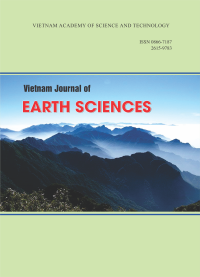Study on the accuracy of the numerical modeling of the groundwater movement due to spatial and temporal discretization
Author affiliations
DOI:
https://doi.org/10.15625/0866-7187/36/4/6430Keywords:
Finite element, Shape function, Weighting function, Element size, Time Step.Abstract
Groundwater (GW) modeling has become popular in Vietnam since the last quarter of century. However not always a due attention on the accuracy of the modeling has being paid, making the modeling results be doubted and of negligible use in many cases, especially in academic works. A groundwater modeling program by finite element (FE) method (FEM) by linear shape functions has been compiled to consider the modeling accuracy due to spatial and temporal discretization. Sufficient groundwater boundary conditions in combination with aquifer parameters have been selected for needed groundwater well analytical solution in order to make assessment of the accuracy of the FE model results. Within the range of FE element size (hxy) of 15m¸25m and time step 0.25day¸1.25day with backward time scheme, the water level (WL) obtained by FEM in a very narrow zone around the pumping well (30m for case of time step Dt=0.25day and 230m for Dt=1.25day ) is insignificantly smaller than the true WL, while for the remaining area the WL by FEM is greater than the true WL, but not greater then 7.6cm. In all cases of different element sizes, the smaller time step, the more accurate WL results, however the improvement is hard to be more than 1cm. Some recommendations on aquifer parameter calibration, aquifer parameter determination by numerical modeling from monitoring WL and pumping test data, GW modeling for foundation seepage deformation have been proposed for required accuracy of the GW modeling for practical water resources and engineering purposes.
ReferencesDriscoll, F.G., 1987: Groundwater and Wells. Published by Johnson Division, St. Paul, Minnesota 55112, USA.
Nguyen Van Hoang, 2014-2016: Research study No. NCCB-ĐHUD.2012-G/04 "Compilation of FEM software for groundwater movement and solute-transport in groundwater - application to the central coastal area".
Bear, J., Verruijt, A., 1987: Modeling groundwater flow and pollution, D. Reidel Publishing Company, Dordrecht, Holland.
Bear, J., 1979: Hydraulics of groundwater. McGraw-Hill Publishing Company. Polubarinova-Kochina, 1977: Theory of Groundwater Movement. Higher education publishing house. Moscow (in Russian).
Zienkiewicz, O.C., Morgan, K., 1983: Finite elements and approximation. John Wiley & Sons.
Zienkiewicz, O.C., Kelly, D.W., Gago, J., Babuska, 1981: Hierarchical Finite Element Approaches Error Estimates and Adaptive Refinement. The Mathematics of Finite Element Approaches. J. Whitemman, Ed., Academic,
New York.







